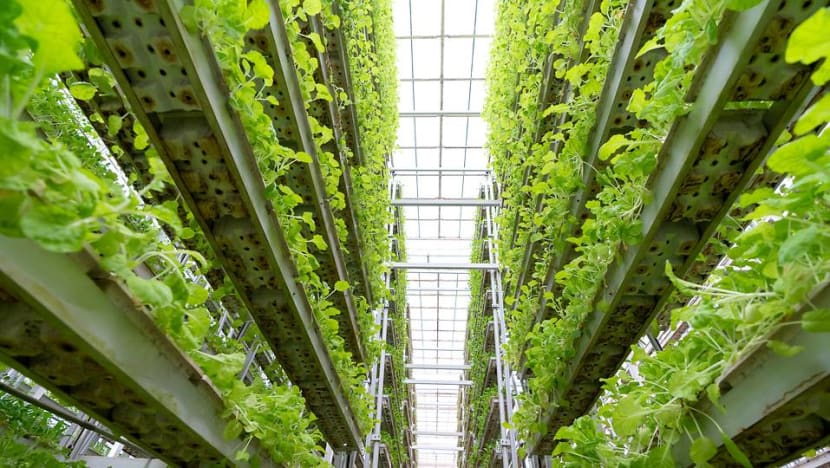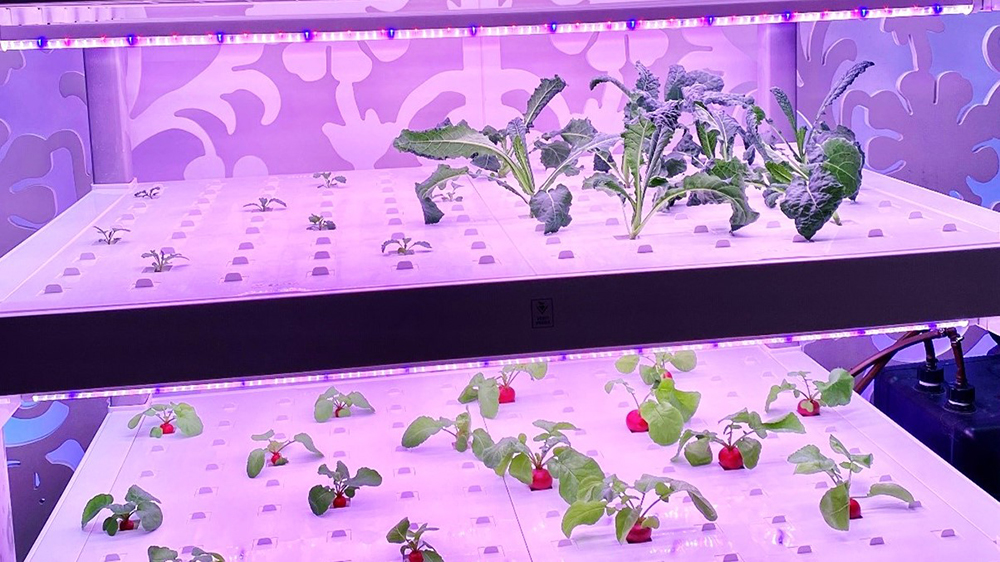https://www.channelnewsasia.com/pod...getables-energy-climate-conversations-4436976
Hosts Jack Board and Liling Tan bring years of expertise covering climate change and sustainability to this weekly podcast. A one-stop shop for news, views and interviews.
27 Jun 2024 08:22AM(Updated: 27 Jun 2024 09:08AM)
The vertical farming revolution is a way to deal with the impact of climate change on traditional farming and food insecurity. But heavy energy and technology costs are getting in the way of scale and commercial success.
Jack Board and Liling Tan lay out the facts on this episode of the Climate Conversations podcast.

Sky Greens is Singapore’s first farm to secure a new national standard for organic primary produce grown in or near an urban area. (Photo: Nespresso)
Here's an excerpt from the conversation:
Liling Tan:
You mentioned that at COP28, more than US$7billion was raised for "climate positive action" in the food systems sector. Basically, it's to help global food systems fight climate change. Given that food production is responsible for about a third of greenhouse gas emissions, about 30 percent, and increasingly, it's also being threatened by worsening droughts and unpredictable weather patterns.
So I'm expecting food to be even more front and centre (of discussions) as we go forward at these climate summits, especially with all this talk of high tech solutions like vertical farming.
Jack Board:
I would definitely agree. So let's dig into the tech a bit, and then also what's happening in Asia. Answer me, Liling, is this technology actually producing positive results in Southeast Asia in particular, from what you've seen, what you've been reporting about, and is it proving to be this silver bullet that we need to push the needle on, on both carbon emissions and food security concerns?
Liling:
Yes and no. Vertical farming provides a really controlled environment that is data driven. You can track the data, the conditions. So it really allows the operators to fully manage the surrounding in which these produce are being grown. The problem is how energy-intensive it can be to basically create artificial sunlight and it makes it very hard to compete when it comes to pricing against other more traditionally grown produce, including imported ones. So this is raising questions about their viability in the short to medium term, especially for an industry that's still considered rather nascent.
Climate Conversations Podcast: Sky high farming solves one climate problem but creates another
It isn't just Singapore which is seeing agri-tech firms shutting or scaling down - it is happening in other parts of the world too.Hosts Jack Board and Liling Tan bring years of expertise covering climate change and sustainability to this weekly podcast. A one-stop shop for news, views and interviews.
27 Jun 2024 08:22AM(Updated: 27 Jun 2024 09:08AM)
The vertical farming revolution is a way to deal with the impact of climate change on traditional farming and food insecurity. But heavy energy and technology costs are getting in the way of scale and commercial success.
Jack Board and Liling Tan lay out the facts on this episode of the Climate Conversations podcast.

Sky Greens is Singapore’s first farm to secure a new national standard for organic primary produce grown in or near an urban area. (Photo: Nespresso)
Here's an excerpt from the conversation:
Liling Tan:
You mentioned that at COP28, more than US$7billion was raised for "climate positive action" in the food systems sector. Basically, it's to help global food systems fight climate change. Given that food production is responsible for about a third of greenhouse gas emissions, about 30 percent, and increasingly, it's also being threatened by worsening droughts and unpredictable weather patterns.
So I'm expecting food to be even more front and centre (of discussions) as we go forward at these climate summits, especially with all this talk of high tech solutions like vertical farming.
Jack Board:
I would definitely agree. So let's dig into the tech a bit, and then also what's happening in Asia. Answer me, Liling, is this technology actually producing positive results in Southeast Asia in particular, from what you've seen, what you've been reporting about, and is it proving to be this silver bullet that we need to push the needle on, on both carbon emissions and food security concerns?
Liling:
Yes and no. Vertical farming provides a really controlled environment that is data driven. You can track the data, the conditions. So it really allows the operators to fully manage the surrounding in which these produce are being grown. The problem is how energy-intensive it can be to basically create artificial sunlight and it makes it very hard to compete when it comes to pricing against other more traditionally grown produce, including imported ones. So this is raising questions about their viability in the short to medium term, especially for an industry that's still considered rather nascent.

